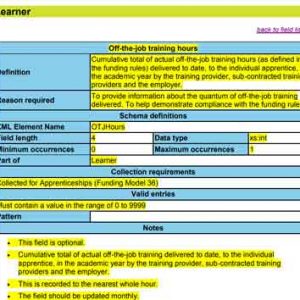Providers will be asked to log apprentices’ off-the-job training hours to prove that the deeply unpopular minimum funding requirement is being met, the government has revealed.
A new data field for individual learner records (ILR) – which is to be updated monthly – is supposed to “help” providers “demonstrate compliance” with the requirement for at least 20 per cent of apprentices’ time to be spent training away from work.
It will not be introduced until 2018/19 and is described in new ILR guidance as “optional”. But the Association of Employment and Learning Providers believes that it goes against previous assurances over how the rule, which is hated by employers, will be enforced.
“All along Education and Skills Funding Agency has assured us that there would be no additional administrative burdens, but this a significant add-on,” said AELP boss Mark Dawe.
“It’s another example of process being prioritised over outcome, imposing more bureaucracy on employers and providers, while offering no insight on the quality of the learning.”
Further guidance on the new field explains that it should record the “cumulative total of actual off-the-job training delivered to date, to the individual apprentice, in the academic year by the training provider”.
It should also take into account “subcontracted training providers and the employer”.
The data is to be recorded on a monthly basis to the “nearest whole hour”.
This will contribute to the full ILR for each learner, a data record that must be kept by providers and returned to the ESFA to secure funding.
The funding rule introduced last May requires that every apprentice “spend at least 20 per cent of their time on off-the-job training”.
It is a major bone of contention among employers, particularly smaller firms that claim they cannot afford to let apprentices spend a fifth of their time away from work.
This has had a knock-on effect for providers struggling to convince companies to take on apprentices, and provoked growing calls for much clearer explanation on how the rule will work in practice.
AELP, ahead of its autumn conference last November, at which the rule loomed large, asked the government to address employer resistance to the rule.
It is one of many actions that the association has been asking for, to foster a “more flexible” approach to the apprenticeship reforms and make them a success – and something that apprenticeships minister Anne Milton has herself said she would like to implement.
A DfE spokesperson explained why the new data field was being launched.
“This new field will provide insight for the DfE and the Institute for Apprenticeships into the amount of time apprentices on particular apprenticeship standards and frameworks spend on off-the-job training. The insight will help policy makers evaluate the effectiveness of apprenticeship reforms,” he said.








Is this really news? It’s been in the funding guidance since the very start. If you’re only picking this up now, then I think you might be in a bit of trouble!
Totally agree Robert. There has always been an expectation by every inspectorate (TSC, ALI and then Ofsted)that apprentices should receive one day of training in their five days of work or otherwise it is not an apprenticeship. Nothing has changed except there is less of the traditional off-the-job delivery, in different premises from where the apprentice works (hopefully with the use of learning materials and workplace visits to give the 20%). Are those who are supposedly ‘angry’ not aware of what they have signed up to deliver? The funding guidance in recent times has not been specific about reviews of progress and welfare, but that did not mean that those delivering apprenticeships should (or could) suddenly drop them. Ditto English and maths; if an apprentice already has a grade C GCSE – you are still supposed to reinforce and improve these two essentials as part of apprenticeship delivery.
It is the requirement to collect it monthly on the ILR which is the problem. It’s impractical to do this, the ILR is the wrong place to do it, and due to the yearly ILR submission and that working hours are not recorded in the same way, it will not give the answer that the agency are looking for.
I agree with Robert. We’ve been recording since day 1 on both our MI system and our e portfolio.
Thanks Robert thought I was missing something…!!!
Wow…. So providers not only record Off the Job Training through the normal means(eg electronic portfolios etc)to remove the burden from employers having to gather evidence for the ESFA and Ofsted but they are now also going to be encouraged to record the detail on the ILR for the DfE and IfA. At this rate we are going to need more back office administrators than front line delivery staff. Surely this is not where apprenticeship funding is needed most?
This approach again highlights the short-comings of one rule and requirement for all the types of Apprenticeships. This requirement to submit monthly data may be regarded as appropriate for what should be the real target of this policy i.e. 16-18 age apprentices. It is right that they should be getting 20% “proper” paid time off to complete apprenticeship related activities. For adult apprentices who were already in the job getting paid the going rate for the role, some slack should be cut here! Given that this rule is in place, then providing auditable evidence should be the focus which is quite different from be forced to complete a return on every learner every month.